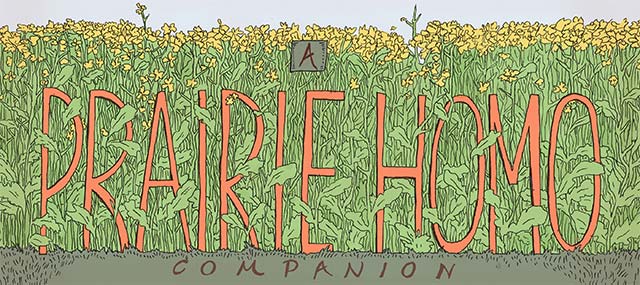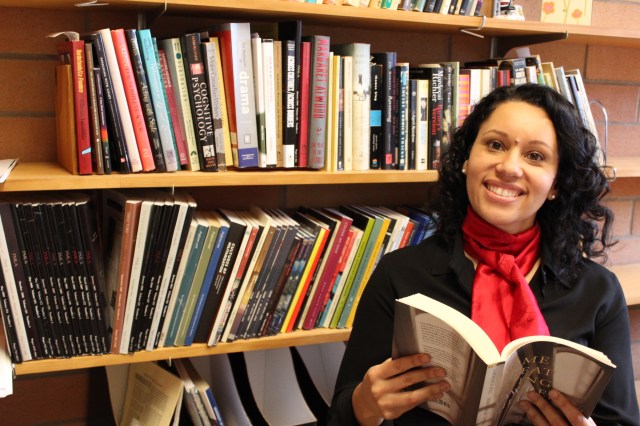A Prairie Homo Companion is a regular column that celebrates the Canadian prairies, canola fields and big skies, and the paradoxes of being a fine-ass lady prairie homo.
Header by Rory Midhani

This is my unique perspective on being a half-black, half-white human who sometimes feels uncomfortable using the term Person of Colour to refer to herself. I use it, because the English language is limited and there aren’t enough words to describe the (very) mixed-race Canadian prairie weirdo that I am. As well, when I’m referred to as Black and only Black, I feel like an important part of me is being ignored. I’d like to stress that this is only my experience, which is shaped not only by where I grew up, but how. If I were a half-white, half-black American, my views on race and identity would probably be completely different. Similarly, I’m 100% sure many Western Canadian non-white humans are perfectly fine with the term Person of Colour and that’s perfectly okay. However you feel, it’s all okay, but personally, I find it alienating when I come across writings that mention the Black Experience or the POC Experience, and I can’t relate, especially when, because of the colour of my skin, people assume I should be able to. It’s enough to cause an identity crisis when people who are not you put you into a specific category and assume you’ve had certain racialized experiences, when, although you have had to deal with racist micro-aggressions, you still wonder, when reading writings by Black people and People of Colour, if you identify more with the oppression (because you’re half Black) or with the privilege (because you’re half White and grew up in a mostly white environment).
It’s hard for me to talk about race because I don’t want to offend anybody. Having grown up here in Alberta, I’ll never know what it’s like to be part black in a country with a history of slavery and a specific kind of horrible, institutionalized racism towards black people. I want to learn about and listen to the experiences of all sorts of people who identify as Black or as People of Colour, but at the same time, I want to carve out a space for myself, my Canadian weirdo self who spent her early childhood with a white (half Dutch) mother and a father who’s black, but not black like African-American or even black like Afro-Canadian, but Ghanaian. His accent has a slight British twinge to it and the biggest obstacle he had to face when he moved to Edmonton was not racism, but the cold. I never thought of my childhood home as a mixed-raced household; it wasn’t that black and white (see what I did there?). No, my house was a mix of Dutch delft (white plates and salt shakers decorated with blue etchings of cows and windmills), African straw hats, British literature, and Dutch Sinterklaas songs. All of this impacted the way I see myself and the way I see race. And though I may be unique, I don’t think it makes my perspective any less important. If anything, my voice is especially crucial because there aren’t many of us speaking out from the in-between places.
I feel like multiculturalism was never really designed to imagine me.
from Between: Living in the Hyphen

The 2005 documentary, Between: Living in the Hyphen moved me in a way many blogs, articles, and books on race haven’t because it had the first discussion I’ve ever seen about people like me: in-between Canadians of mixed ancestry who don’t easily fit into categories. There is a lot out there on what it means to be a Black American or what it means to be a (usually American) Person of Colour but when I watched this amazing documentary, I was able to see and listen to Canadians who felt, and in some cases even looked, like me. It helped me realize that my experiences in the in-between are worth talking about. From the National Film Board:
Anne Marie Nakagawa’s documentary examines what it means to have a background of mixed ancestries that cannot be easily categorized. By focusing on 7 Canadians who have one parent from a European background and one of a visible minority, she attempts to get at the root of what it means to be multi-ethnic in a world that wants each person to fit into a single category. Finding a satisfactory frame of reference in our ‘multicultural utopia’ turns out to be more complex than one might think. Between: Living in the Hyphen offers a provocative glimpse of what the future holds: a departure from hyphenated names towards a celebration of fluidity and being mixed.
In the film, Karina Vernon, a half-black, half-white Canadian writer and academic, expressed something I often feel weird admitting to myself or heaven-forbid, telling to others: in Black or People of Colour Spaces, which are meant to be healing and safe, there are times I feel like a fraud. Of course, that’s not to say that I don’t like those spaces, that I don’t benefit from listening to peoples’ stories and experiences or even that I can’t relate to some of them; but still, sometimes this nagging sense that I don’t completely belong creeps up. Thing is, I’m White as much as I’m Black; in fact, maybe I’m even more White than Black because after my parents split up, I lived mostly with my mom. So I wonder, What am I doing taking part in a POC conversation? I ask myself, Shouldn’t I be quietly listening and learning like a respectful, privileged white person?

I think that there’s always a part of me that feels like a fraud, that feels somehow phoney, like “Oh, I’m not really black. I’m mixed. Or I don’t even know… like, I don’t come from a black household so how can I represent? How can I really be black? There’s really that crisis of inauthenticity, I think.
-Karina Vernon (half black, half white) speaking about how she feels in black communities, Between: Living in the Hyphen
When someone refers to me as Black, I feel both inauthentic and uncomfortable. Inwardly, I cringe. It’s not because I see being Black as something of which to be ashamed. I didn’t grow up in a culture and atmosphere in which Blackness was ever a source of shame. If I travelled to Africa and someone referred to me as White, which my dad assures me they will do because of my light skin and North American mannerisms, I’d feel equally uncomfortable because it wouldn’t be true. I’m not simply black or white. I’m both. I know that people like other people to fit into these neat little boxes: you’re gay or straight, White or Black. Existing in the spaces in-between arouses suspicion and makes others uncomfortable. But I’m not about to change how I identify (as Black em White, together, at once) for the sake of someone else’s comfort. Additionally, referring to people as Black even if they’re part White has a history rooted in America’s one-drop rule.
I feel like she’s black. I’m black and I’m her mother and I believe in the one-drop theory.
–Halle Berry speaking to Ebony magazine about her mixed-race daughter.
The one-drop rule is the idea that any African ancestry makes a person black, and has its roots in twentieth-century anti-miscegenation laws that sought to preserve white “purity.” It might seem strange of Halle Berry to have referred to a law with such racist roots when speaking of her daughter, but in this interesting piece by Jami Floyd, a mixed-race journalist, it’s explained why an American of mixed-heritage would want to call herself Black:
I see my young children step out into a more perfect union [than before.] But it is an America that is far from perfect. They have already encountered the N-word, slights about their hair and features and an overall culture that celebrates their Anglo Saxon great-grandparents (who were slaveholders) while discounting their African American ancestors (who were slaves)… Halle Berry’s daughter will have to choose a racial identity, the way [Halle Berry] had to choose a racial identity. In America, that means it will probably be chosen, at least in part, by the way people react to her. In America, her skin color (black or white) will be something that people use to define her.
I appreciate that Floyd emphasizes “in America” because as a mixed-race Canadian with an African immigrant parent, I don’t have slave-holder and slave ancestors. I don’t have Black ancestors who were transported to a new country against their will and then horrifically mistreated. I don’t associate my black side with struggle. Maybe if I did I would want to claim Black as an identity. In “Between: Living in the Hyphen” Charlene Hellson, a part-white, part-Aboriginal Canadian woman explains her relationship to her Aboriginal side with part of a spoken-word poem:
Whenever I think I might be white, it is revealed that I share in the plight, ancestral fight.
If, like Aboriginal Canadians or African-Americans, the “colour” in the Person of Colour identifier connected me to a struggle for survival against whiteness that had taken place in the not-so-distant past, in the country where I live, I would probably want to define myself by that colour because it would represent the part of me that would have struggled, survived, and grown strong in the face of oppression. But that is not my experience. I obviously have different feelings and a different relationship to Blackness than an African-American has. To think of me or to refer to me as Black is therefore to place me in an historical and cultural context that is not my own. And I’m not cool with that.
I don’t think being half of anything is a bad thing because I am the whole of me.
-from Between: Living in the Hyphen
Just like there is no one, uniform Black Experience, I feel like what it means to be a Person of Colour can change from person to person. The problem with the term POC is that it puts all POCs in the same group and although all of our lives have been impacted by white supremacy, and that’s some serious shit, the degree of this impact varies according to a multitude of circumstances, like nationality, culture, and class to name a few.
My childhood was great — I was safe, had a good education, plenty of freedom to grow up. But that’s because my family was well off there. It’s the same as here — money helps make things smoother, right? Even if you’re part of an oppressed class, it helps.
–Dhati (born in India and grew up in the Middle East), Straddler on the Street
It was the wealth of my father’s family that allowed him to come to Canada from Ghana and attend university here. Immigration is never easy, but having money made it easier. I know a lot of POC in Canada whose wealth is what allowed them to come to this country in the first place and is what continues to give them advantages. Ironically, it was the white side of my family that immigrated from Europe in poverty. Before my Opa got a decent job as a commercial artist, he struggled to make ends meet taking jobs no rich Canadian would, working as a grave digger and a grain-elevator worker, a very dangerous job if you know anything about how the combination of wood and flour makes grain elevators fires waiting to happen. This is why, on a personal level, I have a hard time associating a POC identity for myself with a lack of privilege, and whiteness with privilege. I in no way want to deny the widespread effects of colonialism or racism or white supremacy. Instead, I simply want to point out that to assume that all POC have similar experiences with oppression related to their race is to deny the lived realities of a fair number of us.
Again, I want to emphasize that had I grown up in a country with a history of enslaving (and now imprisoning) people whose skin colour looks like mine, I would probably have a different relationship to my Black heritage, but it’s important to understand that racism is not the same in all cultures.
US/Western imperialism is so widespread that it even imposes its ways of doing racism on the rest of the world, and on people of color.
–Janani, “What’s Wrong With The Term Person of Colour,” in Black Girl Dangerous
Though Canada is a part of Western imperialism, it has a very different history than the US, and this history obviously influences how Canada does racism. In fact, each country has not only its own particular ways of cooking, celebrating, and speaking, but also its own brand of racism.
When I travelled to Europe, I was surprised to hear about the various horrible experiences with racism many white Europeans have encountered. I realized that there was so much I didn’t know about how racism works across colour and nationalities. It’s complicated and it’s difficult to understand; but I think we all need to start by realizing that there is no singular experience lived and felt by Black people and People of Colour. Whiteness shouldn’t be the only factor we consider when deciding who’s privileged and who’s not. White privilege, though of course it exists, can sometimes work as an over-simplification and doesn’t take into account the way various non-Americans experience racism. It’s important to listen to the many ways different people from different cultures with different histories identify themselves and experience race and racism. It’s not as simple as black and white. And there’s much to be learned in the intersections between cultures and histories, in the in-between places and from the in-between people.
I’d like to challenge those two hegemonous poles who’d like to claim a part of me because I feel like I’ve lived in-between and I like the in-between. It’s a place that I’d like to spruce up a bit. I’d like to, you know, put some nice furniture in the in-between place.
-Fred Wah, Canadian poet, novelist, and scholar of Chinese and Europen mixed ancestry in Between: Living in the Hyphen







